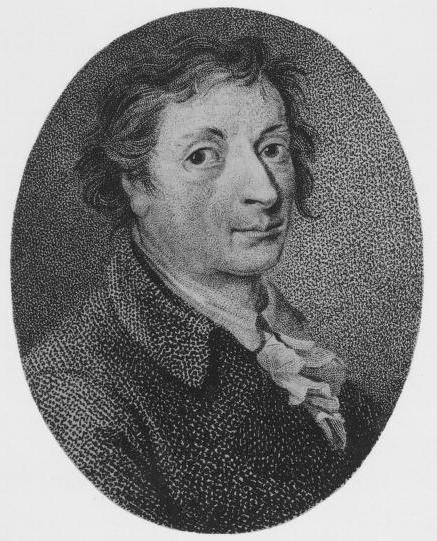- Franz Karl Achard
Infobox Scientist
name = Franz Karl Achard
box_width =
image_width = 150px
caption = Franz Karl Achard
birth_date =April 28 ,1753
birth_place =Berlin
death_date =April 20 ,1821
death_place =
residence =
citizenship =
nationality =Prussia
ethnicity =
field =Physics ,chemistry
work_institutions =
alma_mater =
doctoral_advisor =
doctoral_students =
known_for =Sugar
author_abbrev_bot =
author_abbrev_zoo =
influences =
influenced =
prizes =
religion =
footnotes =Franz Karl Achard (
April 28 ,1753 ,Berlin -April 20 ,1821 , Wohlau-Cunern) was a German (Prussia n) chemist, physicist and biologist. His principal discovery was the production ofsugar fromsugar beet s. [Citation |id =PMID :13086516 |url = http://www.ncbi.nlm.nih.gov/pubmed/13086516 | last = Wolff | first = G. | year = 1953 |title = Franz Karl Achard, 1753-1821; a contribution of the cultural history of sugar |volume=7 |issue=4 |periodical=Medizinische Monatsschrift |pages=253-4 ]Life and work
Achard was born in
Berlin , the son of preacher Max Guillaume Achard and his wife Marguerite Elisabeth (Rouppert). He studied physics and chemistry in Berlin. He became interested in sugar refining through his stepfather. At the age of 20, Achard entered the "Circle of Friends of Natural Sciences" and metAndreas Sigismund Marggraf , then director of the physical classes at the Royal Academy of Sciences. Achard studied many subjects, includingmeteorology ,evaporation chillness,electricity ,telegraphy ,gravity ,lightning arrester s, and published in German and French.Achard was a favorite of King
Frederick II of Prussia , and was directly reported to the King on his research twice a week. About a study on the influence of electricity on mental capabilities, Frederick II was reported to have said: "If he is able to provide reason for the half wits in my Prussian states using electricity, then he is worth more than his own weight in gold."In 1776 Achard was elected to the Royal Academy of Sciences at Berlin. Following the death of Marggraf in 1782 went on to become the director of the physical classes of the academy.
For his discoveries in the acclimatisation of tobacco to Germany, the king granted him a lifetime pension of 500 taler. Achard was also esteemed by
Frederick William II of Prussia .Achard revived the discovery by Marggraf in 1747 that sugar beets contained sugar, and devised a process to produce sugar from sugar beets. Beginning in 1789, he planted various sugar-bearing plants on his manor in Caulsdorf near Berlin. Because of their efficiency, he soon preferred sugar beets. In the following year he studied different varieties of beets and the influence of
fertiliser s. The research was interrupted when Caulsdorf manor burnt down and had to be sold. Achard later continued on the manor Französisch Buchholz.In 1801, with the support of King
Friedrich Wilhelm III , he opened the first sugar beet refinery in Konary,Silesia ,Prussia . In 1802, the refinery processed 400 tons of beets with a degree of efficiency of 4%. Other refineries were soon built by his studentsJohann Gottlob Nathusius andMoritz, Freiherr von Koppy . Later, refineries appeared inBohemia ,Augsburg and in 1811 inFrance . It was destroyed in 1945 by the French.English sugar merchants offered Achard 200,000 taler to declare his experiments a failure, but refused. With Achards discovery, sugar was no longer a luxury product, but became available for everyone. The "culture of the sugar bowl" began.
In 1794, Achard built an
optical telegraph betweenSpandau andBellevue . This device had been invented just one year before byClaude Chappe .Due to the economical incapacity of Achard, and several fires caused by technological shortcomings, his refineries were declared bankrupt in 1815. He died, destitute, in 1821 in Wohlau. His life's work was carried on however, mainly by French industrials and came back to Germany with the refineries of
Matthias Christian Rabbethge .Publications
* "Lectures on Experimental Philosophy" 4 vol., 1792
* "Abhandlung über die Bereitung des Zuckers aus der in vielen Provinzen allerhöchst - Dero Staaten, als Viehfutter häufig angebauten Runkelrübe, nebst den dazu gehörigen Belägen und Proben des Runkelrübenzuckers", Berlin, 1799
* "Anleitung zur Bereitung des Rohzuckers aus Rüben", Berlin, 1800
* "Kurze Geschichte der Beweise der Ausführbarkeit im Großen der Zuckerfabrication aus Runkelrüben", Berlin, 1800
* "Anleitung zum Anbau der Runkelrüben", Breslau, 1803
* "Über den Einfluß der Runkelrübenzuckerfabrication auf die Ökonomie", Glogau, 1805
* "Die europäische Zuckerfabrication aus Runkelrüben", Leipzig, 1812References
Further reading
*
External links
* [http://www.schlesien-ahnenforschung.de/Allerlei/ruebenzucker.html Franz Karl Achard Ein fast unvergessener Pionier des Rübenzuckers] (in German)
* [http://lsa-st23.sachsen-anhalt.de/llg/geschichte/achard.htm Anläßlich des 175. Todestages von Friedrich Carl ACHARD, ein historischer Rückblick] (German)
* (German)
* [http://www.dtmb.de/Zucker-Museum/mgeschic.htm Zuckermuseum Berlin] (German)
Wikimedia Foundation. 2010.
